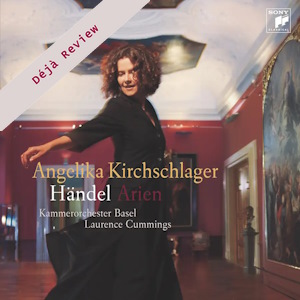
Déjà Review: this review was first published in January 2007 and the recording is still available.
George Frideric Handel (1685-1759)
Arias from Ariodante, Giulio Cesare, & Arianna in Creta
Angelika Kirchschlager (mezzo)
Kammerorchester Basel/Laurence Cummings
rec. 2006, Landgasthof Riehen, Basel, Switzerland
Sony Classical 82876 889522 [68]
There is a plethora of brilliant mezzo-sopranos around today. In the last few months recitals by Lili Paasikivi, Catherine King, Christianne Stotijn, Sophie Koch and Magdalena Kozena have come my way. They were impressive in their respective ways. In complete sets and elsewhere Elina Garanca, Christine Rice, Marie-Ange Todorovitch, Marianne Beate Kielland and Joyce DiDonato have shown their credentials. Now Angelika Kirchschlager joins the company. Ms Kirchschlager is not exactly new, she made her operatic debut in Graz in 1992, and was engaged at the Vienna State Opera two years later. She appears in the most prestigious houses and concert halls and has a number of highly acclaimed recordings to her credit. Of all the mezzos listed hers is possibly the lightest, brightest and most flexible, something that is important when it comes to Handel’s florid writing. Handel wrote these arias to show off his singers. The fabled Margherita Durastanti, the creator of Sesto in Giulio Cesare and also Tauride in Arianna in Creta, is represented here by the dramatic and brilliant Quall eon, where two obbligato French horns illustrate the roaring felines. This is the last track (tr. 11) but the tracklist and the aria texts have been reversed. The order presented in the heading above is correct.
Without being a Handel specialist I have long admired his tireless musical invention. Every time I come across a new aria I am just as stunned. Some of the arias here are old friends and favourites, those from Giulio Cesare, for example, and Dopo notte from Ariodante, but whether he writes lively dramatic pieces, with breakneck coloratura, like Con l’ali di costanza (tr. 2) or gloomily elegiac examples like Scherza infida (tr. 3) the freshness of the invention remains just as striking. Newcomers could dip in at random and find grains of gold. Kirchschlager with her stunning technique never puts a foot wrong. Even the most intricate runs and trills are executed with superior elegance.
She is backed by alert playing on period instruments by Kammerorchester Basel, who to no inconsiderable degree contribute to the overall excellence of this disc. Conductor Laurence Cummings, whom I first encountered as harpsichordist in a series of recordings for Naxos, never lets the tension slacken. The recorded sound is crisp and atmospheric and the booklet gives good information in three languages. This disc is another highly attractive addition to my already impressive collection of present-day mezzos.
Göran Forsling
Buying this recording via a link below generates revenue for MWI, which helps the site remain free



















